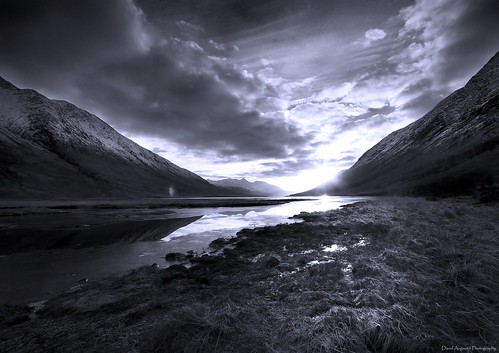 |
| {image credit: David Augustin} |
I will fear no evil;
your rod and your staff, they comfort me.
---
"valley": there may be fertility and quiet in a valley, but it is strategically inferior. For a flock of sheep, it's more dangerous than a mountaintop.
"shadow of death": not death itself, but close enough to inspire great fear. One's life is being threatened in some way (whether that is literal mortal peril, or a threat to your wellbeing in some other way). More than an everyday inconvenience . . . this is a several trial.
"I walk": like it or not, these trials come. We must cross the valley. (A thought here: I suppose that the shepherd must still faithfully be leading the flock, just as he led them to quiet waters.)
"even though": a hint of something unexpected, contrary to our naturally fearful response to the situation.
"no evil": this is strong language with zero exceptions. Evil is terrifying, the enemy, death, Satan, wickedness of all kinds. Even the shadow of death? The psalmist doesn't fear that?
"for": now comes the explanation.
"you": we move from describing the Lord in third person to addressing him directly; this is a new note of intimacy.
"with me": the poor sheep isn't wandering through the valley alone. The shepherd, furthermore, is no passive bystander and no fellow victim. He takes action.
"are": not a future hope. The Lord is with the flock at all times, from entrance to exit.
"rod and staff": used both to fend off attackers and guide unruly sheep back into line. The shepherd protects us from a two-fold danger-- within, our tendency to stray into doubt or self-reliance. Without, the enemies sent by the world and its diabolical prince.
"comfort": we can rest even in this valley!
"comfort": we can rest even in this valley!
No comments:
Post a Comment